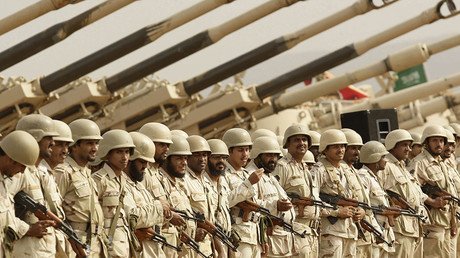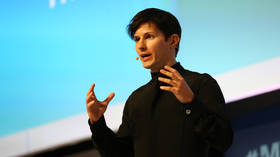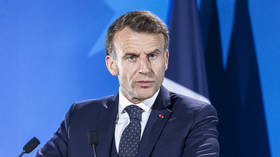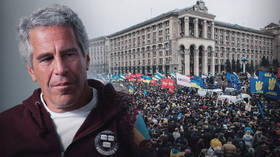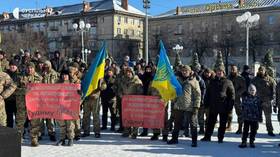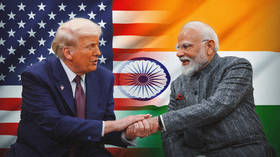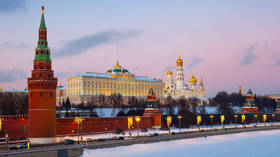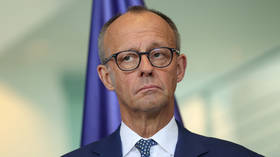Russia can’t ‘unilaterally’ impose Syria ceasefire while opposition rejects peace talks – Churkin
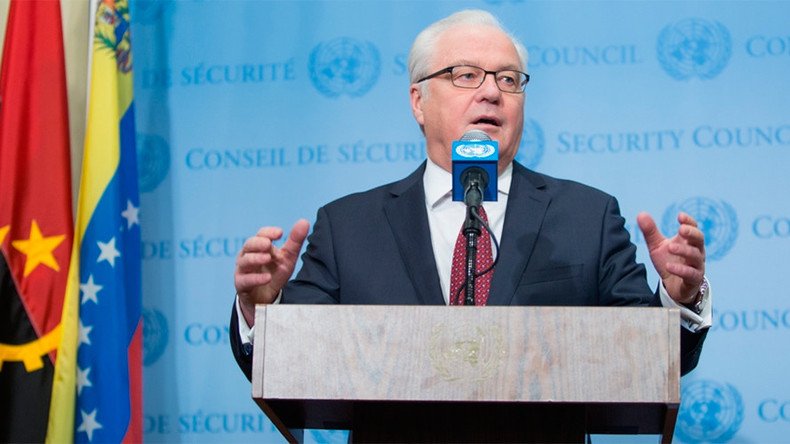
Russia cannot “unilaterally” stop airstrikes and bring about a ceasefire in Syria while the US-led coalition keeps bombing and terrorists continue their rampage, the Russian UN envoy said, noting the gravity of peace talks but stressing the legitimacy of Moscow’s campaign.
“We cannot stop this unilaterally: what about the terrorist and opposition groups, are they going to stop too? What about this American-led coalition – are they going to stop too?” Churkin told reporters after a closed-door meeting of the UN Security Council on Syria.
LIVE UPDATES: Syria peace talks in Geneva
However, he stressed the importance of the Syria peace talks, while also expressing regret over the halted Geneva meeting.
“They were on the table in Geneva and the opposition delegation walked out. Unfortunately, it seems to be encouraged by some of our Western colleagues,” Churkin said.
Russia has been facing strong criticism over its airstrikes, which were quickly blamed for the peace talks’ three-week suspension. Thus, on Friday French ambassador Francois Delattre said that the UN Special Envoy for Syria Staffan de Mistura paused the talks after Russia increased air strikes.
“He did not say that,” Churkin responded when asked to comment on the accusations. “My good friend Francois Delattre should have stayed through the meeting rather than put words into Mr. Staffan de Mistura’s mouth,” he said. “Staffan de Mistura was at his diplomatic best.”
US claims Russia is ‘in part’ to blame for Syrian talks’ halt, misquotes UN as proof https://t.co/6XUDxEMkcppic.twitter.com/m5hGys6kTn
— RT (@RT_com) February 4, 2016
In his speech earlier this week, de Mistura indeed abstained from direct accusations, only saying that the reason for his decision stemmed from a disagreement between the Syrian government and the opposition on humanitarian issues.
Responding to the West’s condemnation, Churkin stressed that members of the US-led coalition “do not really have grounds” – either moral or formal – to accuse Russia.
“Those people who have encouraged the opposition to essentially walk out of the talks have been rejecting our continued offers for them to arrange really practical cooperation between us and them in the situation of Syria,” he said.
Moreover, unlike the coalition, Russia’s campaign is “fully legitimate” since it was started on the “invitation” of the Syrian government, the Russian UN envoy stressed.
Nevertheless, despite the mutual distrust, Churkin has called to refrain from “public recrimination”, saying, “this is not the right thing to do now.”
“We need to have even stronger concerted efforts in order to overcome the problems we are facing with Syria,” he said.
On February 11, the International Syria Support Group (ISSG) will be meeting in Munich to discuss how to accelerate an end to the Syrian conflict. According to Churkin, Russia is going to bring “some new ideas to the table.”
“We hope that other colleagues, other members of the International Syria Support Group are going also to show their responsibility,” he said.
Mistura initially postponed the talks until February 25, but according to Churkin the peace efforts can be resumed earlier.
“I think we had a good discussion and I think we are encouraged that Staffan de Mistura believes that the talks can be resumed, that even maybe they can be resumed before February 25th,” he told reporters in New York.
At the same time, he did stress that new preconditions to resume talks, such as demanding that sieges be lifted or humanitarian access be granted, will only delay talks.
“It’s very strange that our colleagues for a long time were saying that for the ceasefire to happen there must be some political progress. For political progress to take place there need to be political negotiations. Now they are saying that the ceasefire must take place before political negotiations,” he said.
Churkin has again invited the US-led coalition to “pick up our proposal for cooperation.”
“As soon as we started our bombing campaign on September 30th we invited the United States and their coalition to join the coordination cell we have in Bagdad where we coordinate things with Iraq, Syria and also with Iran. Or any other place – they refused," he said."Maybe they were afraid that if they do that (this is my personal guess) some of the links between some members of coalition and terrorist groups were going to be revealed.”
